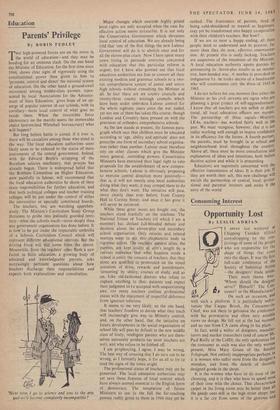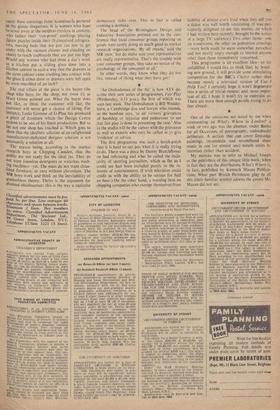Consuming Interest
Opportunity Lost
By LESLIE ADRIAN
I SPENT last weekend at Chipping Camden (Glos.) eavesdropping on the con- ferrings of some of the peePle who are responsible for the shape of things that come into the shops. It was the first full-scale conference of the Society of Industrial Artists —the designers' trade union' Their main theme Was' 'Whom should the designer serve?' Himself? The Con' sumer? or the Manufacturer? 0,1514 On such an occasion, arid with such a platform, it is particularly unfor- tunate that Caspar Brook, the Consumeren- Chief, was not there to galvanise the conference with his provocative and often very sensible views on design. He fell out at the last moment and no one from CA came along in his place. In fact, amid a welter of designers, manufne" turers and market researchers (and of course Mr' Paul Reilly of the ColD), the only spokesman for the consumer as such was also the only woman present, Miss Mary Green of the SundaY Telegraph. Not entirely inappropriate perhaps, 3,9 it is women who suffer most from the designer s mistakes, and from the dearth of decentlY designed goods in the shops. It is the women who have to do most of the choosing, and it is they who have to spend most of their time with the choice. That characterless carpet in the living room may be better than all the gaudy ones still in the high street shops, 13n,t it is a far cry from some of the glorious an°
costly floor coverings from Scandinavia pictured in the glossy agazines. It is women who have to scour away at the needless crevices in cookers, who ladder their 'run-proof' stockings playing Jigsaw puzzles inside their ill-conceived refrigera- tors, moving beds that are just too low to get under with the vacuum cleaner and standing on chairs to reach cupboards that are just too high. Would any woman who had done a day's work in a kitchen put a sliding glass door into a kitchen cabinet in such a way that the drawers in the same cabinet came crashing into contact with the glass if either door or drawers were left open by even one-third of an inch?
The real villain of the piece is the buyer (the chap who buys for the shop, not from it), as Mary Green pointed out. What the buyer does ROI like, or think the ,customer will like, the customer will never get a chance of liking. For instance, Leslie Gomm of G-Plan has produced a piece of furniture which the Design Centre reckon to be one of his finest productions. But so far not one shop has touched it. Which goes to Show that the idealistic solution of an enlightened manufacturer-dedicated designer solution is not necessarily a solution at all. The reason being, according to the market research boys at Chipping Camden, that the Pnblie are not ready for the ideal yet. They do n. (it want foamless detergents or waterless wash- ing machines—yet. The mass do not want clean- lined furniture, or cars without chromium. The MR boys work and think on the inevitability of gradualness theory. Theirs is the argument for Planned obsolescence; this is the way a capitalist
democracy ticks over. This in fact is called creating a demand.
The head of the Birmingham Design and Industries Association pointed out to the con- ference that local consumer groups reporting on goods were surely doing as much good as market research organisations. 'By all means,' said the MR men, 'but do make sure your ,representatives are really representative. That's the trouble with your consumer groups, they take no notice of the psychology of the consumer at all.'
In other words, they know what they do not like, instead of liking what they have got !
'An Ombudsman of the Air' is how ATV de- scribe their new series of programmes, Fair Play (Wednesday, 6.15 p.m.), the first of which was seen last week. The Ombudsman is Bill Wedder- burn, a Cambridge don and lawyer who intends, as the handout says, `to air viewers' grievances Of hardship or injustice and endeavour to see that fair play is done in presenting the case.' Also in the studio will be the viewer with the grievance as well as experts who may be called in to give 'evidence' or advice.
The first programme was such a hotch-potch that it is hard to say just what it is really trying to do. There was a piece by Danny Blanchflower on bad refereeing and what he called the insin- cerity of sporting journalism, which as far as I could see had been included purely in the in- terests of entertainment. (I wish television could credit us with the ability to be serious for half an hour.) On the other hand, a warning item on shipping companies who exempt themselves from liability of almost every kind when they sell you a ticket was well worth ventilating. (I was par- ticularly delighted to see this matter, on which 1 had written here recently, brought to the notice of a large TV audience.) Two other items—one on woodworm, the other on pedestrian crossings —were both made to seem somewhat parochial and not nearly angry enough to interest anyone other than those immediately concerned.
This programme is an excellent idea—so far unfulfilled. I would like to think that, by break- ing new ground, it will provide some stimulating competition for the BBC's Choice rather than become merely a televisual version of Can I Help You? I certainly hope it won't degenerate into a series of trivial moans; and, most impor- tant of all, I hope it won't try to entertain us. There are more than enough people trying to do that a1ready.
One of the omissions not noted by me when commenting on What's Where in London? a week or two ago was the absence, under Books for all Occasions, of pornography, undoubtedly deliberate. A section that can cover fore-edge paintings, incunabula and secondhand sheet music in one (or almost one) breath omits by intention rather than accident.
My mistake was to refer to Michael Joseph as the publishers of this unique little book, when in fact they are the distributors. What's Where is, in fact, published by Kenneth Mason Publica- tions. What part British Petroleum play in all this (their familiar symbol adorns the cover) Mr. Mason did not say.



































 Previous page
Previous page